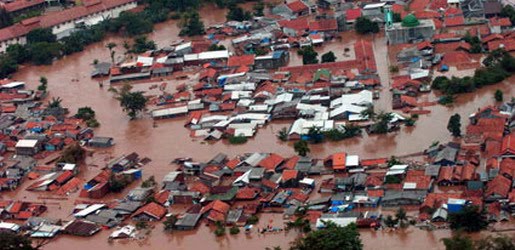Earthquake
An earthquake (also known as a quake, tremor or temblor) is the result of a sudden release of energy in the Earth's crust that creates seismic waves.

Tsunami
A tsunami also called a tsunami wave train, and at one time incorrectly referred to as a tidal wave, is a series of water waves caused by the displacement of a large volume of a body of water, usually an ocean, though it can occur in large lakes.

Tornado
A tornado (often referred to as a twister or, erroneously, a cyclone) is a violent, dangerous, rotating column of air that is in contact with both the surface of the earth and a cumulonimbus cloud or, in rare cases, the base of a cumulus cloud.

Floods
A flood is an overflow of an expanse of water that submerges land. The EU Floods directive defines a flood as a temporary covering by water of land not normally covered by water

Volcanic Eruptions
Volcanoes can cause widespread destruction and consequent disaster through several ways. The effects include the volcanic eruption itself that may cause harm following the explosion of the volcano or the fall of rock.

Etymology and History of Tsunami
7:32 AM
Posted by Disaster
The term tsunami comes from the Japanese 津波, composed of the two kanji 津 (tsu) meaning "harbor" and 波 (nami), meaning "wave". (For the plural, one can either follow ordinary English practice and add an s, or use an invariable plural as in the Japanese.)
Tsunami are sometimes referred to as tidal waves. In recent years, this term has fallen out of favor, especially in the scientific community, because tsunami actually have nothing to do with tides. The once-popular term derives from their most common appearance, which is that of an extraordinarily high tidal bore. Tsunami and tides both produce waves of water that move inland, but in the case of tsunami the inland movement of water is much greater and lasts for a longer period, giving the impression of an incredibly high tide. Although the meanings of "tidal" include "resembling" or "having the form or character of" the tides, and the term tsunami is no more accurate because tsunami are not limited to harbours, use of the term tidal wave is discouraged by geologists and oceanographers.
There are only a few other languages that have an equivalent native word. In the Tamil language, the word is aazhi peralai. In the Acehnese language, it is ië beuna or alôn buluëk (Depending on the dialect. Note that in the fellow Austronesian language of Tagalog, a major language in the Philippines, alon means "wave".) On Simeulue island, off the western coast of Sumatra in Indonesia, in the Defayan language the word is smong, while in the Sigulai language it is emong.
As early as 426 B.C. the Greek historian Thucydides inquired in his book History of the Peloponnesian War about the causes of tsunami, and was the first to argue that ocean earthquakes must be the cause.
The cause, in my opinion, of this phenomenon must be sought in the earthquake. At the point where its shock has been the most violent the sea is driven back, and suddenly recoiling with redoubled force, causes the inundation. Without an earthquake I do not see how such an accident could happen.
The Roman historian Ammianus Marcellinus (Res Gestae 26.10.15-19) described the typical sequence of a tsunami, including an incipient earthquake, the sudden retreat of the sea and a following gigantic wave, after the 365 A.D. tsunami devastated Alexandria.
While Japan may have the longest recorded history of tsunamis, the sheer destruction caused by the 2004 earthquake and tsunami event mark it as the most devastating of its kind in modern times, killing around 230,000 people. The Sumatran region is not unused to tsunamis either, with earthquakes of varying magnitudes regularly occurring off the coast of the island.